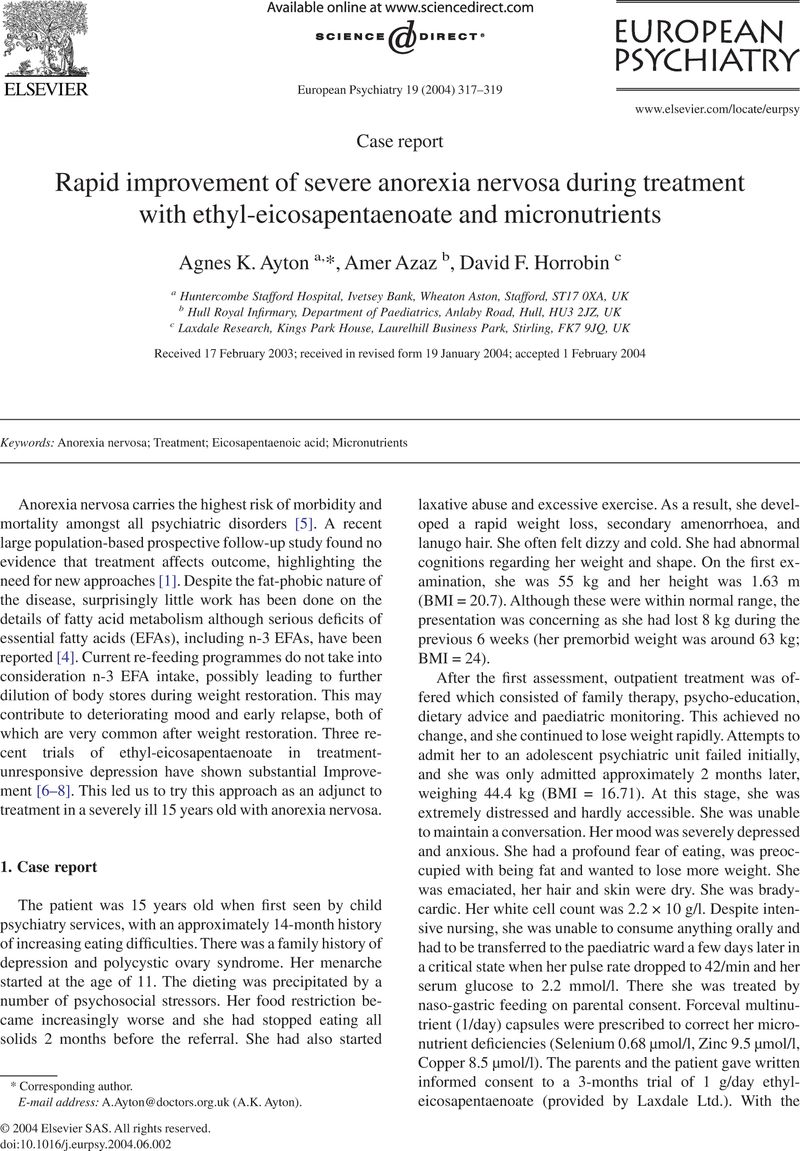Crossref Citations
This article has been cited by the following publications. This list is generated based on data provided by Crossref.
2007.
Glycerophospholipids in the Brain.
p.
341.
Kovalchik, S.
2008.
Comparative study of rate of weight loss among premorbid and healthy restrictive eaters.
Eating and Weight Disorders - Studies on Anorexia, Bulimia and Obesity,
Vol. 13,
Issue. 4,
p.
176.
Sugiyama, Eiko
Ishikawa, Yasuko
Li, Yufeng
Kagai, Tomoko
Nobayashi, Misaki
Tanaka, Naoki
Kamijo, Yuji
Yokoyama, Shin
Hara, Atsushi
and
Aoyama, Toshifumi
2008.
Eicosapentaenoic acid lowers plasma and liver cholesterol levels in the presence of peroxisome proliferators-activated receptor alpha.
Life Sciences,
Vol. 83,
Issue. 1-2,
p.
19.
Crow, Scott J.
Mitchell, James E.
Roerig, James D.
and
Steffen, Kristine
2009.
What potential role is there for medication treatment in anorexia nervosa?.
International Journal of Eating Disorders,
Vol. 42,
Issue. 1,
p.
1.
Swenne, Ingemar
Rosling, Agneta
Tengblad, Siv
and
Vessby, Bengt
2011.
Omega‐3 polyunsaturated essential fatty acids are associated with depression in adolescents with eating disorders and weight loss.
Acta Paediatrica,
Vol. 100,
Issue. 12,
p.
1610.
Swenne, I
Rosling, A
Tengblad, S
and
Vessby, B
2011.
Essential fatty acid status in teenage girls with eating disorders and weight loss.
Acta Paediatrica,
Vol. 100,
Issue. 5,
p.
762.
Swenne, Ingemar
and
Rosling, Agneta
2012.
Omega‐3 essential fatty acid status is improved during nutritional rehabilitation of adolescent girls with eating disorders and weight loss.
Acta Paediatrica,
Vol. 101,
Issue. 8,
p.
858.
Maguire, Sarah
Touyz, Stephen
Surgenor, Lois
Crosby, Ross D.
Engel, Scott G.
Lacey, Hubert
Heywood‐Everett, Suzanne
and
Le Grange, Daniel
2012.
The clinician administered staging instrument for anorexia nervosa: Development and psychometric properties.
International Journal of Eating Disorders,
Vol. 45,
Issue. 3,
p.
390.
Rucklidge, Julia J
and
Kaplan, Bonnie J
2013.
Broad-spectrum micronutrient formulas for the treatment of psychiatric symptoms: a systematic review.
Expert Review of Neurotherapeutics,
Vol. 13,
Issue. 1,
p.
49.
Hilmers, David
and
Abrams, Steven
2014.
Nutrition-Infection Interactions and Impacts on Human Health.
p.
1.
Frank, Guido K. W.
and
Shott, Megan E.
2016.
The Role of Psychotropic Medications in the Management of Anorexia Nervosa: Rationale, Evidence and Future Prospects.
CNS Drugs,
Vol. 30,
Issue. 5,
p.
419.
Couturier, Jennifer
2016.
Encyclopedia of Feeding and Eating Disorders.
p.
1.
Shih, P B
Yang, J
Morisseau, C
German, J B
Zeeland, A A Scott-Van
Armando, A M
Quehenberger, O
Bergen, A W
Magistretti, P
Berrettini, W
Halmi, K A
Schork, N
Hammock, B D
and
Kaye, W
2016.
Dysregulation of soluble epoxide hydrolase and lipidomic profiles in anorexia nervosa.
Molecular Psychiatry,
Vol. 21,
Issue. 4,
p.
537.
Shih, P. Betty
Morisseau, Christophe
Le, Thu
Woodside, Blake
and
German, J. Bruce
2017.
Personalized polyunsaturated fatty acids as a potential adjunctive treatment for anorexia nervosa.
Prostaglandins & Other Lipid Mediators,
Vol. 133,
Issue. ,
p.
11.
Maguire, Sarah
Surgenor, Lois J.
Le Grange, Daniel
Lacey, Hubert
Crosby, Ross D.
Engel, Scott G.
Fromholtz, Kirsty M.
Bamford, Bryony
and
Touyz, Stephen
2017.
Examining a staging model for anorexia nervosa: empirical exploration of a four stage model of severity.
Journal of Eating Disorders,
Vol. 5,
Issue. 1,
Couturier, Jennifer
2017.
Encyclopedia of Feeding and Eating Disorders.
p.
623.
Nguyen, Nhien
Dow, Michelle
Woodside, Blake
German, J. Bruce
Quehenberger, Oswald
and
Shih, Pei-an Betty
2019.
Food-Intake Normalization of Dysregulated Fatty Acids in Women with Anorexia Nervosa.
Nutrients,
Vol. 11,
Issue. 9,
p.
2208.
Blanchet, Corinne
Guillaume, Sébastien
Bat-Pitault, Flora
Carles, Marie-Emilie
Clarke, Julia
Dodin, Vincent
Duriez, Philibert
Gerardin, Priscille
Hanachi-Guidoum, Mouna
Iceta, Sylvain
Leger, Juliane
Segrestin, Bérénice
Stheneur, Chantal
and
Godart, Nathalie
2019.
Medication in AN: A Multidisciplinary Overview of Meta-Analyses and Systematic Reviews.
Journal of Clinical Medicine,
Vol. 8,
Issue. 2,
p.
278.
Satogami, Kazumi
Tseng, Ping-Tao
Su, Kuan-Pin
Takahashi, Shun
Ukai, Satoshi
Li, Dian-Jeng
Chen, Tien-Yu
Lin, Pao-Yen
Chen, Yen-Wen
and
Matsuoka, Yutaka J.
2019.
Relationship between polyunsaturated fatty acid and eating disorders: Systematic review and meta-analysis.
Prostaglandins, Leukotrienes and Essential Fatty Acids,
Vol. 142,
Issue. ,
p.
11.
Piróg-Balcerzak, Agnieszka M.
Bażyńska, Anna K.
Biernacka, Katarzyna
Brągoszewska, Joanna
Popek, Lidia
Remberk, Barbara
Orlecka, Natalia
and
Rybakowski, Filip
2020.
A randomized, double-blind, placebo-controlled study of polyunsaturated fatty acids efficacy in adolescents with anorexia nervosa.
Pharmacotherapy in Psychiatry and Neurology,
Vol. 36,
Issue. 2,
p.
95.




Comments
No Comments have been published for this article.